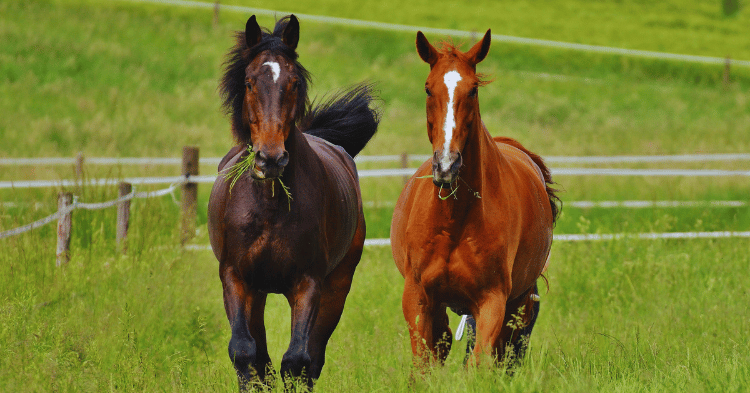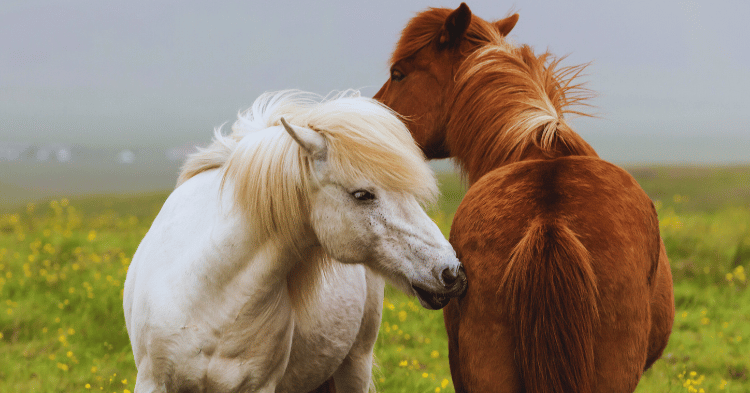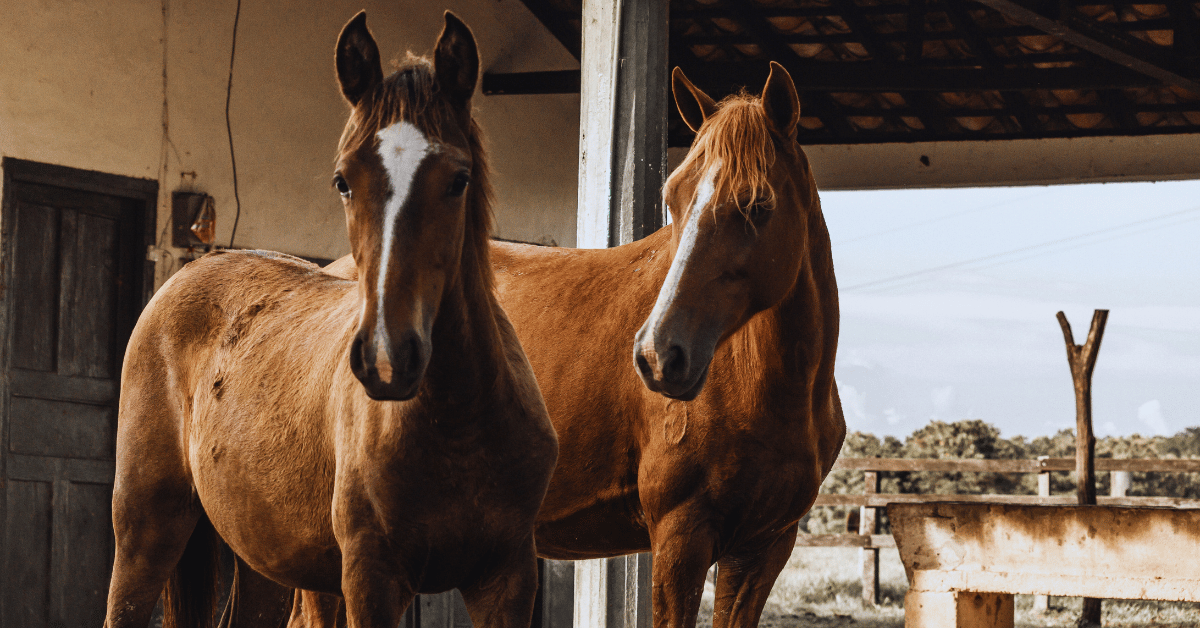Picture this: a lone horse standing in a quiet pasture, the air thick with an eerie silence. At first glance, it might seem serene—a postcard moment—but beneath the surface, something vital may be missing. Does a horse need a companion ?
Absolutely. Horses are deeply social creatures, hardwired by millennia of herd dynamics to crave connection. Without companionship, loneliness can creep in, manifesting as boredom, anxiety, or even depression. Imagine the stress of isolation—not just emotional, but physical too, as solitary horses often develop unhealthy behaviors like cribbing or pacing.
It’s no wonder equine experts stress the need for social bonds, whether it’s with another horse, a donkey, or even a friendly goat. Offering companionship isn’t just kind; it’s a fundamental part of fulfilling the psychological and emotional needs of these herd-bound animals. Whether they gallop with a buddy or share quiet grazing moments, connection is their lifeblood. Let’s delve deeper into why.
Why Horses Need Companions
Psychological Effects of Social Isolation
Horses are inherently social animals, and deprivation of companionship can lead to significant psychological stress. Horses might experience acute distress when separated from others for routine care or training, leading to frantic calling, agitation, and pacing. Social isolation impacts behavior, physiology, and brain activity across various species in similar ways. Isolated animals often vocalize more and show increased agitation and movement.
In horses, isolation can overshadow responses to pain, making it challenging to accurately assess pain severity (The Horse). Stress from lack of companionship may cause behaviors like excessive running, vocalizations, and even weight loss. Prolonged social isolation can lead to ‘learned helplessness,’ where the horse becomes passive after repeated exposure to uncontrollable stress.
| Signs of Social Isolation | Description |
|---|---|
| Agitation and Pacing | Repetitive movements indicating stress. |
| Frantic Calling | Loud vocalizations to nearby horses. |
| Excessive Running | Increased movement due to lack of companionship. |
| Weight Loss | Stress-induced changes in eating behavior. |
| Learned Helplessness | Passive behavior due to stress. |
Benefits of Herd Life
Living in a herd provides numerous benefits for horses. Domestic horses share the same instincts as their wild counterparts and feel safer within a herd. In a group, they can share responsibilities such as vigilance, grooming, and social bonding, which reduces stress levels (RSPCA). Herd life allows horses to engage in natural behaviors, providing psychological comfort.
When horses are part of a herd, they exhibit:
- Increased Social Interaction: Horses engage in mutual grooming and play, fostering social bonds.
- Shared Vigilance: Horses take turns watching for potential threats, which lowers individual stress.
- Reduced Behavioral Issues: Being in a group reduces instances of boredom and stereotypic behaviors like cribbing or weaving.
| Benefits | Description |
|---|---|
| Social Interaction | Promotes grooming and play among horses. |
| Shared Vigilance | Lowers individual stress by taking turns to watch for threats. |
| Reduces Boredom | Decreases likelihood of stereotypic behaviors. |
| Natural Behaviors | Allows engagement in instinctual activities. |
| Psychological Well-being | Overall mental health improvement. |
For further insights on understanding horses’ social needs and care tips, explore our articles on do horses like to be ridden, do horses yawn, and do horses sleep on their side.
Signs of Distress in Solitary Horses

Recognizing signs of distress in horses that lack companionship is crucial for their well-being. They exhibit various behavioral cues and physical indicators when socially isolated or stressed.
Behavioral Cues
Social isolation significantly impacts a horse’s behavior. Some common behavioral signs of distress include:
- Excessive Vocalization: Horses may vocalize more, calling out to potential companions.
- Agitation: Frantic calling, agitation, and pacing are common when they’re separated from pasture mates (The Horse).
- Locomotor Syndrome: Increased vigilance, movement, and even repetitive actions such as running or circling (The Horse).
- Learned Helplessness: Horses may exhibit a state of learned helplessness, appearing withdrawn or unresponsive.
| Behavioral Cues | Description |
|---|---|
| Excessive Vocalization | Frequent calling out |
| Agitation | Frantic movements, calling, pacing |
| Locomotor Syndrome | Increased vigilance, running, circling |
| Learned Helplessness | Withdrawal, unresponsiveness |
Physical Indicators
In addition to behavioral changes, solitary horses also display various physical signs of distress:
- Weight Loss: Stress and anxiety can lead to loss of appetite and subsequent weight loss (RSPCA).
- Poor Coat Condition: A solitary horse may have a dull or rough coat due to stress-related grooming neglect.
- Gastrointestinal Issues: Stress can cause colic or other digestive disturbances.
- Immunosuppression: Chronic stress impacts immune function, making horses more susceptible to illnesses (RSPCA).
| Physical Indicators | Description |
|---|---|
| Weight Loss | Reduced appetite due to stress |
| Poor Coat Condition | Dull, rough coat from neglect |
| Gastrointestinal Issues | Stress-induced colic, digestive issues |
| Immunosuppression | Increased susceptibility to illnesses |
Understanding the signs of distress in solitary horses helps owners provide the necessary companionship and care, ensuring their horses lead a happy and healthy life. For more information on suitable companions, visit our section on choosing a suitable companion.
Importance of Equine Companionship
Equine companionship plays a crucial role in a horse’s well-being. Understanding why horses need companions helps horse owners provide the best care for their animals.
Bonding with Other Horses
Horses are inherently social creatures that thrive in the company of others. In a natural setting, horses live in herds where they engage in social behaviors like mutual grooming, playing, and standing together to keep each other warm or fend off flies. These interactions are vital for maintaining the bonds among herd members, which are essential for their mental and emotional well-being.
A horse’s instinct to form attachments to other horses is strong, often lasting a lifetime. This instinct is rooted in their natural behavior of living in herds, which provides them with a sense of security and belonging. When horses bond with each other, they feel safer and more content, reducing their stress levels significantly (Equiculture).
Even if another horse is not available, horses can form strong bonds with other animals. However, another horse remains the ideal companion. The mutual understanding and interactions between horses cannot be fully replicated by other species.
Role of Companions in Stress Reduction
The presence of companions plays a pivotal role in reducing stress levels in horses. Horses naturally feel safer when surrounded by other horses due to their powerful instinct to seek safety in numbers. This is especially important in preventing herd animals from experiencing feelings of vulnerability and distress when alone.
The companionship of other horses or suitable companion animals can significantly reduce stress-related behaviors in solitary horses. Stress-related behaviors in horses can include pacing, excessive vocalization, and lack of appetite. Providing a companion can alleviate these signs and contribute to a more relaxed and happier horse.
| Stress Indicator | With Companion | Without Companion |
|---|---|---|
| Pacing | Rarely observed | Frequently observed |
| Excessive Vocalization | Rarely observed | Frequently observed |
| Lack of Appetite | Rarely observed | Frequently observed |
Routine management and care of a companion horse are crucial. Easy access to social interactions with other horses contributes to their overall health and happiness. When horses have the opportunity to bond and interact, it enriches their lives and ensures their mental well-being.
To explore more about social behaviors in horses, you may find articles on horse socialization and keeping them healthy interesting. For example, read more about do horses laugh and do horses sleep standing up.
Caring for Companion Horses

Horses are highly social animals and thrive on companionship. Ensuring they have a suitable companion and proper care is vital for their well-being and happiness. This section will provide guidance on how to choose a suitable companion and outline the necessary routine care and management.
Choosing a Suitable Companion
Selecting the right companion for your horse is essential for fostering a harmonious relationship. According to the RSPCA, living as part of a herd provides a sense of security and safety. Here are some tips to consider:
- Compatibility: Evaluate temperament and social behavior. Horses that are calm and friendly are more likely to bond well.
- Age and Size: Choose a companion with similar age and size to prevent bullying or mismatched energy levels.
- Health Status: Ensure the new companion is healthy and vaccinated to avoid introducing diseases.
Horses engage in social behaviors like mutual grooming, playing, and standing together to maintain bonds (RSPCA). It’s important to observe the initial interaction between horses to ensure they get along.
For further details on what to look for in a companion horse, please refer to our article on do horses like to be ridden.
Routine Care and Management
Caring for companion horses requires consistent attention and a well-planned routine. Here are key aspects of managing a companion horse:
- Daily Exercise: Provide regular exercise and turnout to pasture. Exercise is crucial for the physical and mental health of horses.
- Grooming: Regular grooming helps maintain a healthy coat and skin, and it provides an opportunity to check for injuries or health issues.
- Hoof and Dental Care: Regular hoof cleaning and trimming are essential. Dental checks and maintenance help prevent oral health problems.
- Vaccinations and Parasite Control: Ensure vaccinations are up-to-date and implement a parasite control program to prevent illnesses.
- Nutrition: Provide a balanced diet appropriate for the horse’s age, weight, and activity level. Fresh water should always be available.
Additional Activities
Engaging in activities like Natural Horsemanship can provide mental stimulation and strengthen the bond between horses (RSPCA). Practicing these activities can also serve as a form of exercise and training for both horses.
| Aspect of Care | Importance | Frequency |
|---|---|---|
| Daily Exercise | Physical Health and Mental Stimulation | Daily |
| Grooming | Maintenance of Coat Health and Injury Check | Daily |
| Hoof and Dental Care | Prevent Oral and Hoof Health Problems | Monthly |
| Vaccinations and Parasite Control | Prevent Illnesses and Pests | Regular as Per Vet Advice |
| Nutrition | Balanced Diet for Health and Energy | Daily |
For more information, you may find our articles on can horses eat bananas, can horses eat watermelon, and can horses eat apples particularly useful when considering dietary options.
Proper care and thoughtful management of companion horses not only enhance their quality of life but also contribute to a happy and stress-free environment for your primary horse.

